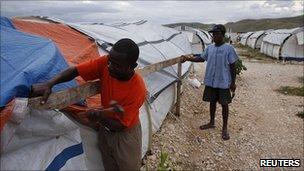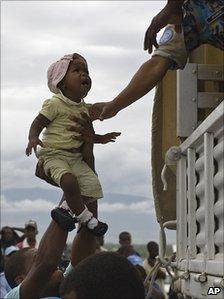Rain hits Haiti as Tropical Storm Tomas approaches
- Published
Refugees living in camps in Port-au-Prince are being urged to leave
Heavy rain has started to fall in the Haitian capital Port-au-Prince as a powerful storm approaches, threatening earthquake survivors living in camps.
The government has urged the 1.3 million people living in tented homes to find sturdier shelter, but most have stayed, saying they have nowhere to go.
Forecasters say Tropical Storm Tomas is gaining strength and warn of the danger of flooding and mudslides.
Health workers fear heavy rain will exacerbate Haiti's cholera epidemic.
The outbreak of the water-borne disease - which has so far killed more than 400 people and infected more than 6,700 in Haiti - has not seriously affected the capital, but aid agencies say flooding could change that.
Haitian President Rene Preval went on national radio on Thursday to urge people to take precautions and evacuate the camps.
"Protect your lives," he said, before acknowledging that the authorities did not "have enough places [on buses] to move everyone".
The BBC's Laura Trevelyan in Port-au-Prince says few refugees have heeded the government warning, although mothers and babies have been evacuated from an exposed camp near the mountains.

Those staying in the camps are making their shelters as strong as possible
Stefano Zannini, Medecins Sans Frontieres' head of mission in Haiti, described the situation as "precarious" and said destruction of tents would cause a new wave of homelessness.
He told the BBC that the atmosphere in the camps was "a mixture of fear and desperation - or resignation".
"It is the third big problem people here have had to deal with this year," he said.
Fear and confusion
Tomas, which has winds of up to 110km (65mph), appears to be strengthening as it approaches Haiti, the Miami-based National Hurricane Center says.
In the early hours of Friday the storm was located about 325 km (200 miles) south-west of Port-au-Prince, and expected to make landfall later in the day.
The NHC warned of hurricane conditions - winds of 119km/h (74mph) or greater - for Haiti, the south-eastern Bahamas, the Caicos Islands and the Cuban province of Guantanamo.
It also issued a tropical storm warning for Jamaica and the Cuban provinces of Santiago de Cuba and Holguin.

The UN is helping those refugees who opt to temporarily leave their tents
Staff at the US Navy base at Guantanamo Bay in Cuba were clearing away debris that could fly around in strong winds, officials said.
In Jamaica, schools were closed in eastern areas and traffic was gridlocked in the capital, Kingston, as businesses closed early.
"On the forecast track, the centre will pass near Haiti or extreme eastern Cuba (late Thursday) and early Friday," the NHC said.
Tomas left at least five people dead in St Lucia over the weekend after hitting the eastern Caribbean as a hurricane.
The storm is expected to dump as much as 38cm (15in) of rain over Haiti and the neighbouring Dominican Republic, with more heavy rain over Jamaica and Cuba.
The UN said more emergency supplies and equipment were urgently needed.
"Even with the existing pre-positioned stocks, the potential magnitude of this disaster urgently calls for additional emergency supplies and equipment," said Nigel Fisher, UN Humanitarian Co-ordinator for Haiti.
Miloudy Vincent, a senior aide in Haiti's education ministry, said schools would close temporarily to be used as shelters.
At the Corail-Cesselesse relocation camp, fighting broke out on Wednesday when officials tried to explain a planned voluntary evacuation of nearly 8,000 people.
Many earthquake survivors worried that the authorities were trying to permanently move them out.
"We are upset because they have not told us where we are going," Domarcand Fenel, the head of a committee of camp residents, told the Reuters news agency. "People believe they want to expel us."
Worsening epidemic
The Salvation Army is concerned for the 15,000 people living in one of its camps near Port-au-Prince which is close to the sea.
"There is no place for these people to go," Bob Poff, director of disaster services for the Salvation Army in Haiti, told the BBC.
"We are providing them with additional materials and will receive the most vulnerable ones at the compound - but there is no way we can shelter that number of people."
Aid agencies have been stockpiling supplies ready for the storm and the US has deployed the USS Iwo Jima to help with any humanitarian emergency.
Doctors have warned that torrential rain could flood sanitary installations and contaminate drinking water, worsening a cholera epidemic in the country.
On Wednesday health officials said there had been a 40% jump in the number of new cholera cases and the death toll was 442, with 105 more deaths since Saturday.
- Published5 November 2010